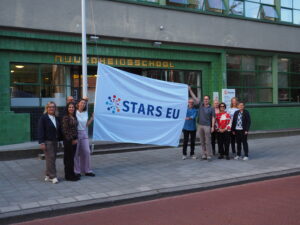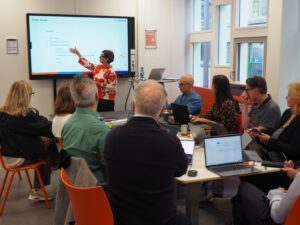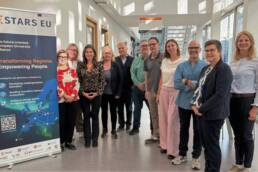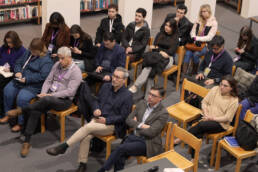The STARS-Health Project, part of the STARS EU framework, recently presented its roadmap to guide older adults in the use of digital health management services, thereby contributing more effectively to reducing health inequalities among the senior population.
Led by Hanze University of Applied Sciences, together with the universities of La Laguna (Spain), West (Sweden), Silesian (Czech Republic) and Bragança (Portugal), STARS-Health officially began its journey with a workshop held in Groningen (the Netherlands). The event also included an online launch, joined by patient organisations, healthcare professionals, educators and researchers.

Opening the session, Rima Dijkstra, STARS EU coordinator, highlighted the importance of collaboration in initiatives of this kind, which are so vital to society. This was further emphasised by Prof. Dr Hans Hobbelen, researcher and professor at Hanze University of Applied Sciences, who warned about the growing number of older adults against a backdrop of a progressively shrinking healthcare workforce — a challenge that underlines the urgent need for projects such as this.
The session continued with presentations, follow-up and updates on the project — developed within the framework of the Thematic Interest Group (TIG) Healthy Ageing — led by the different Work Package leaders. Throughout, participants reaffirmed their strong commitment to the shared mission: to empower older adults with low health literacy by improving access to and use digital services.
Project phases
The first phase of STARS-Health focuses on analysing the current situation of older adults, informal caregivers and healthcare professionals struggling with digital tools. The second phase involves conducting interviews in Sweden, the Netherlands, the Czech Republic, Spain and Portugal.
The project will only select digital applications that meet strict usability criteria for older adults, co-create a digital environment in which users and professionals can jointly select the most suitable apps, and develop training programmes to support professionals in guiding both older adults and their caregivers.
 In addition to the professionals involved, students will play an active role by identifying and classifying apps in their own countries — a clear example of co-creation in action. STARS-Health will also collaborate with @Label2Enable and other European initiatives such as #Care about IT, #Health Noord, #HealthTech in Society and #Proeftuin Toegankelijke Digitale Zorg, which work towards more accessible and inclusive digital healthcare. These synergies broaden the project’s reach and reinforce its impact across Europe.
In addition to the professionals involved, students will play an active role by identifying and classifying apps in their own countries — a clear example of co-creation in action. STARS-Health will also collaborate with @Label2Enable and other European initiatives such as #Care about IT, #Health Noord, #HealthTech in Society and #Proeftuin Toegankelijke Digitale Zorg, which work towards more accessible and inclusive digital healthcare. These synergies broaden the project’s reach and reinforce its impact across Europe.
Research team
The project’s research team, comprising five of the nine partners of STARS EU along with the Canary Islands Health Service (SCS), is led by Prof. Dr Johannes Hobbelen and Dr. Sandra Jorna-Lakke (Hanze University of Applied Sciences); Margareta Karlsson (University West); Rui Pedro Lopes (Polytechnic Institute of Bragança); Sara Darias-Curvo (University of La Laguna); Markéta Skalná (Silesian University in Opava); and Lilisbeth Perestelo-Pérez (Canary Islands Health Service).
STARS-Health will run for three years with funding of €912,060, granted by the European Partnership on Transforming Health and Care Systems (THCS). This is a co-funded action under the Horizon Europe Research and Innovation Framework Programme (2021–2027) of the European Union.
Related Posts
February 28, 2026
In2CoP 2026 strengthens co-creation and innovation in higher education within STARS EU
With 60+ prototypes and three award winners, the event generated initiatives…
February 27, 2026
STARS EU convenes an online workshop on Digital Transformation for students
The call, which will be held on 12 June, is aimed at undergraduate, master's…
February 10, 2026
STARS EU partner IPB celebrates 43 years of regional commitment and international cooperation
The formal anniversary ceremony was held in Chaves (Portugal).




